News



Indian school principals were invited to Japan by the Global 30 Project.
As part of the Global 30 initiative to globalize 13 Japanese universities, the Ministry of Education, Culture, Sports, Science and Technology (MEXT) invited 6 eminent Indian educators and principals to visit Japan from February 10-17, 2013.
The 6 members were:
The aim of the visit was to introduce the delegation to higher education opportunities in English at Japanese universities. Also part of the agenda was to highlight niche areas of Japanese technological expertise and the common cultural heritage that India and Japan share. The weeklong tour was organized by The University of Tokyo and included visiting Tokyo, Kyoto and Nara, both the modern and ancient capitals of Japan.
The 6 members were:
| Mr. Avinash Dikshit | Commissioner | Kendriya Vidyalaya Sangathan, New Delhi |
| Mr. John Zachariah | Principal | Bishop Cotton Boys'School, Bangalore |
| Mr. Sathish Jayarajan | Principal | Mallya Aditi International School, Bangalore |
| Ms. Shantha Chandran | Principal | National Public School, Indiranagar, Bangalore |
| Ms. Rekha Krishnan | Principal | Vasant Valley School, New Delhi |
| Mr. Anand Kumar | Founder | Super 30, Patna |
The aim of the visit was to introduce the delegation to higher education opportunities in English at Japanese universities. Also part of the agenda was to highlight niche areas of Japanese technological expertise and the common cultural heritage that India and Japan share. The weeklong tour was organized by The University of Tokyo and included visiting Tokyo, Kyoto and Nara, both the modern and ancient capitals of Japan.
Highlights of the visit
Tsukukoma, one of Japan's most prestigious government schools
The tour began by visiting a middle and high school affiliated to the University of Tsukuba located in Komaba, Tokyo.
At the school, the Indian delegation observed a chemistry lecture and a practical physics class in progress where the students were lively and participating enthusiastically. The group was particularly impressed by the use of lasers to conduct optical experiments in the practical physics class. This visit to a Japanese high school sparked interest amongst the group in forging exchange agreements with Japanese schools.
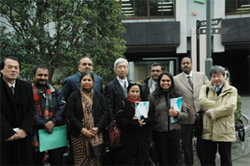
At the school, the Indian delegation observed a chemistry lecture and a practical physics class in progress where the students were lively and participating enthusiastically. The group was particularly impressed by the use of lasers to conduct optical experiments in the practical physics class. This visit to a Japanese high school sparked interest amongst the group in forging exchange agreements with Japanese schools.

University tours
The delegation visited The University of Tokyo, Kyoto University and Ritsumeikan University. At each university presentations were given by Professors on the courses offered in English. The group was taken on tours of engineering and science labs to understand the cutting edge research being done with the advanced facilities available. These universities are top c in Japan and Asia. The delegation had an opportunity to visit preeminent research institutes such as the Earthquake Research Institute at the University of Tokyo and other science and engineering laboratories in all three universities.
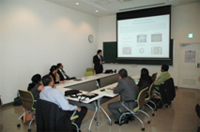
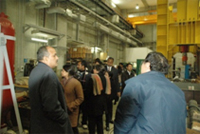
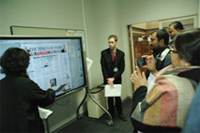



Bullet train experience
Before boarding a bullet train at Tokyo Station, the group visited the Japan Railway Central's control room in Tokyo Station. A wall sized board with electronic displays provides real time information every 15 seconds of all JR Central's trains running between Tokyo and Okayama. A large team of personnel monitor each train as they pass every station. Special equipments check for earthquakes and the weather.
While riding on the bullet train from Tokyo to Kyoto, members of the delegation were taken into the cockpit – a truly rare experience! Everyone was amazed at the dexterity of the highly trained driver. Every 15 seconds the driver checks if the train is running on schedule and controls the speed accordingly to pass every station at the exact time scheduled.
The experience left everyone marveling at Japanese precision, technology and work ethic.
While riding on the bullet train from Tokyo to Kyoto, members of the delegation were taken into the cockpit – a truly rare experience! Everyone was amazed at the dexterity of the highly trained driver. Every 15 seconds the driver checks if the train is running on schedule and controls the speed accordingly to pass every station at the exact time scheduled.
The experience left everyone marveling at Japanese precision, technology and work ethic.
Indo-Japan shared cultural heritage
Japanese Buddhist art, architecture and practices came from India via China and Korea. To pay tribute to the shared cultural heritage of both countries the group visited Yasaka Shrine in Kyoto and Todaiji temple in Nara. Every year a chariot festival takes place at the Yasaka Shrine which is believed to have origins in the Rath yatra of the Jaganath temple in Orissa.
The large statue of Buddha at Todaji temple in Nara was consecrated by Bodhisena, a south Indian monk in 752 A.D. This was the first people to people exchange between Japan and India. Bodhisena spent the rest of his life in Japan spreading the teachings of Buddha.
Japan's Golden temple, the Kinkakuji in Kyoto is an exquisite three story Zen temple with the top two stories covered with pure gold leaf. Originally built in 1397, it has since been rebuilt and re-plated in gold leaf. During the visit to Kinkakuji it began snowing making a splendid sight.
Although not related, it is curious that the only other Golden Temple in the world is the Harmandir Sahib in Amritsar.
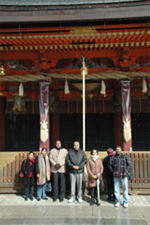
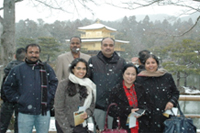
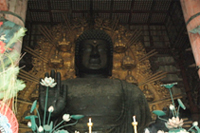
The large statue of Buddha at Todaji temple in Nara was consecrated by Bodhisena, a south Indian monk in 752 A.D. This was the first people to people exchange between Japan and India. Bodhisena spent the rest of his life in Japan spreading the teachings of Buddha.
Japan's Golden temple, the Kinkakuji in Kyoto is an exquisite three story Zen temple with the top two stories covered with pure gold leaf. Originally built in 1397, it has since been rebuilt and re-plated in gold leaf. During the visit to Kinkakuji it began snowing making a splendid sight.
Although not related, it is curious that the only other Golden Temple in the world is the Harmandir Sahib in Amritsar.



Global 30 Networking Symposium
A symposium about higher education opportunities in Japan was held on February 13, 2013. Presentations by the Indian side described the factors motivating Indian students to study abroad and the top destinations for Indian students. During the interactive panel discussion various approaches, ideas, changes were suggested to increase the number of Indian students in Global 30 universities. The main point emphasized was that there is a lack of awareness that Japanese universities have courses offered in English. There is also a general perception that Japan is an expensive country, thus making it important to disseminate information on the numerous scholarships available to students.
The feasibility of introducing exchange agreements with Indian universities to enable students to experience Japanese university life was also discussed. Although many Global 30 courses begin in October as in the US, UK and other countries, the admission and scholarship results are announced later than offers made by other countries. This could be disadvantageous for Japanese universities.
At the reception which followed, the Indian delegation interacted with representatives from other Global 30 universities, Indian students and professors from The University of Tokyo. In their welcome speeches to the Indian delegation, the Vice President of The University of Tokyo, Prof. Haneda, Dean of the Graduate School of Science, Prof. Aihara, and Vice President of Sophia University, Prof. Yui, emphasized that they are eager for more Indian students to enroll in Japanese universities. As the host, Prof. Haneda hoped that the group of eminent educators would go back to their schools and institutions and encourage their students to consider Japan for higher education.
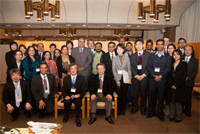
The feasibility of introducing exchange agreements with Indian universities to enable students to experience Japanese university life was also discussed. Although many Global 30 courses begin in October as in the US, UK and other countries, the admission and scholarship results are announced later than offers made by other countries. This could be disadvantageous for Japanese universities.
At the reception which followed, the Indian delegation interacted with representatives from other Global 30 universities, Indian students and professors from The University of Tokyo. In their welcome speeches to the Indian delegation, the Vice President of The University of Tokyo, Prof. Haneda, Dean of the Graduate School of Science, Prof. Aihara, and Vice President of Sophia University, Prof. Yui, emphasized that they are eager for more Indian students to enroll in Japanese universities. As the host, Prof. Haneda hoped that the group of eminent educators would go back to their schools and institutions and encourage their students to consider Japan for higher education.
